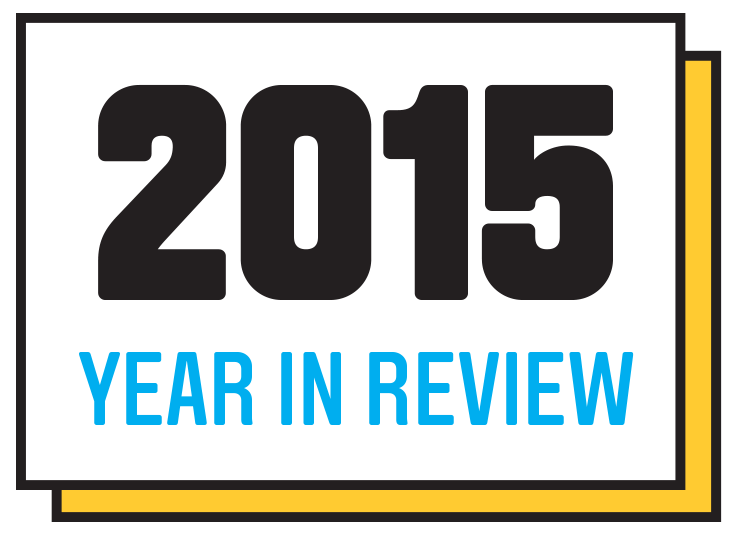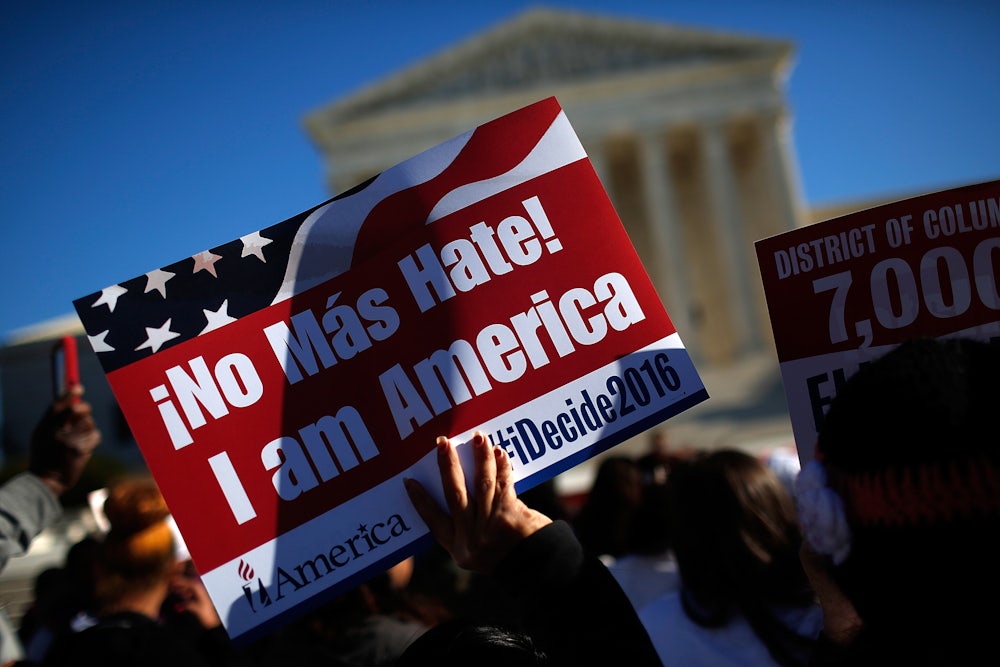
The year in immigration politics began badly and finished up even worse. On a warm Saturday in late January of 2015 (warm for January, anyway), 1,500 of Iowa’s most committed right-wing activists descended on the Hoyt Sherman Place in Des Moines for the first ever Iowa Freedom Summit. House Representative Steve King, Congress’s most aggressively bigoted anti-immigration crusader, was the host. A few days earlier, King had followed up his notorious “calves the size of cantaloupes” riff about the mythic strength of imaginary 130-pound immigrant drug mules by calling Michelle Obama’s invited guest to the State of the Union address, Ana Zamora, a 21-year-old who was brought to the country as an infant and recently received temporary legal status under the Deferred Action for Childhood Arrivals program, “a deportable.”
Most of the as-of-yet-unnanounced candidates in the Republican primary field spoke at the nine-hour conference—including Chris Christie, Scott Walker, Rick Santorum, Mike Huckabee, Carly Fiorina, and Ben Carson—but for presumptive reasons that made sense at the time, Jeb Bush, the party’s anointed favorite, declined the invitation. Bush, with his much-heralded cross-cultural appeal, seemed to have taken the GOP’s stated goal of reaching out to Latinos to heart. Salon’s Simon Maloy was not alone in wondering “why anyone who seriously believes they can be president would want to be caught anywhere near Steve King.”
Few could have predicted just how obscene the national debate over immigration would get in 2015, but the writing was already on the wall that weekend in January: Ted Cruz, who cut his teeth in the Senate defeating comprehensive immigration reform, was the summit’s most energizing speaker; DREAMer activists who tried to interrupt Rick Perry’s speech were drowned out in standing ovation for the Texas governor, who had deployed National Guard troops to the border the previous summer; a reality TV curiosity named Donald Trump made amused headlines by deriding Mitt Romney and dismissing Bush as “soft” on the issue.
About a week before the Freedom Summit, the House of Representatives had passed, at King’s urging, a spending bill for the Department of Homeland Security that explicitly barred funding for President Obama’s 2014 executive order on immigration which would potentially extend legal status to more than a third of the United States’s 12 million undocumented immigrants. King and other hardliners had wanted to insert the poison pill legislation in the federal budget the previous year, but House Speaker John Boehner, in the interest of avoiding yet another government shutdown, had convinced the insurgents to wait. Boehner knew the bill wouldn’t make it through the Senate, and knew that Obama would veto if it somehow did. But he went along with the uprising anyway, because that is the sort of posturing now required of leaders in the Republican Party.
Sure enough, the bill stalled in the Senate, and after a few weeks of nail-biting political theater, Boehner allowed Democrats to vote on a “clean” version before the department’s funds ran dry. Boehner would end up resigning in the Fall, before members of his own caucus could drag him through the same doomed cycle of blackmail, defeat, and embarrassment. But even in seeming failure, Steve King and company emerged triumphant; they got to go back to their districts and boast of having held fast to their extremist values. Cruz, who chastised the Republican Senate leadership for its weakness during the standoff, would take his “party of amnesty” maverick routine on the road later that month, when he announced his campaign for president. By the time Donald Trump barged onto the scene that summer, the Republican base was primed for a strongman who could cut through the petty checks-and-balances of democracy.
A few days after the Freedom Summit, Vice-President Joe Biden took to the op-ed pages of The New York Times to announce the Obama administration’s new “plan for Central America,” which differed from the old plan primarily in the size of its budget. Some 60,000 unaccompanied minors—most of them from Honduras, Guatemala, and El Salvador—had fled across the U.S. southern border the previous year. The administration, content up until that point to treat the region as an afterthought, was now convinced that the “security and prosperity of Central America are inextricably linked with our own.”
In his editorial, Biden wrote of the need for “systemic change” in a region beset by a spiraling crisis of poverty, corruption, and violence. But the strategy he went on to outline was an affirmation of the very policies that produced those conditions, not a departure from them. As a reference, Biden invoked Plan Colombia, the $9 billion aid package he had helped formulate as a senator in 2000. Ostensibly an anti-drug initiative, Plan Colombia was Cold War counterinsurgency repurposed for a modern context. It failed in all of its stated goals and left an assortment of human rights atrocities in its wake. This hasn’t stopped its proponents, on the left and right, from holding it up as a “great success story,” to use Biden’s words, a shining example of the sort of “transformation” possible through the benevolent gift of U.S. leadership.
As Dawn Paley wrote for the New Republic in February, where Plan Colombia did succeed was in creating “a new blueprint for U.S. intervention on behalf of the corporate sector.” Through its first six years in office, the Obama administration replicated that model, adopting, almost by default, a relatively hands-off approach to Central America that combined George W. Bush’s drug war militarism with Bill Clinton’s neoliberal free trade orthodoxy. When Honduran President Manuel Zelaya was ousted in a military coup, in 2009, Secretary of State Hillary Clinton sided, as the United States has for more than a century, with the country’s right-wing elite. Immigration reform, meanwhile, didn’t become a priority until the Democrats had already lost their majority in Congress.
There was a brief moment when the 2014 migration surge seemed like it might force the United States to reckon with its sordid legacy in Central America. But 2015 proved how unready the country was to have an honest conversation about immigration. By mid-year, the momentum behind Biden’s Central America pivot had dissipated, with Syria occupying the place of voyeuristic horror and racist paranoia that Central America had the summer before.
The fight over how many Syrian refugees to admit into the country, or whether to admit any at all, offered another blaring example of how fundamentally warped our immigration politics became in 2015. As Germany prepared to accept some 800,000 Syrians, King and company treated President Obama’s announcement that the United States would resettle 10,000 as an act just shy of treason. Hillary Clinton, perhaps moved by an image published by the AP of the body of a three-year-old washed ashore in Turkey, called on the United States to raise its quota to 65,000, about 15,000 less refugees than Sweden has taken in since September alone.
The fear-mongering ratcheted up a notch in November after the massacre of 130 people by ISIS loyalists in Paris. To his credit, French President Francois Hollande responded by increasing the number of Syrian refugees destined for France by 25%. But 31 U.S. governors, including one Democrat, released statements saying they attempting to ban the resettlement of Syrian refugees in their state. (Several media outlets were quick to quote experts to the effect that states have virtually no say in the resettlement of refugees. Less discussed was the fact that the orchestrator of the Paris attack was Belgian)
News of the killing of 14 people in San Bernardino, California the following month went from yet another regrettable, but unavoidable, mass shooting to an act of unspeakable terror as soon as it was revealed that the perpetrators were Muslim. Donald Trump called for a blanket ban on all Muslims entering the United States; Ted Cruz announced his own plan, a more reasonable, targeted ban, only on those fleeing violence from various places in the Muslim world the United States has in some way made war on—but not, tellingly enough, from Pakistan, the country where one of the San Bernardino attackers was born. (The other, of course, was born in the United States.) Both Trump and Cruz have risen in the polls since then. That the radicalization of Muslims poses some unique threat to American civil society is now an accepted premise, even among those Democrats who denounce Trump’s more outlandish displays of chauvinism.
The speed with which the locus of xenophobic hysteria in America had shifted from the southwest to the Middle East meant that no one raised much concern this summer when the Senate and House passed preliminary foreign appropriations bills that set Central American spending at two-thirds and a third, respectively, of the $1 billion Biden had asked for. Apprehensions at the border were markedly down, which disguised the fact that nothing had changed on the ground in Central America. In July, Insight Crime reported the possibility that post-coup Honduras would cede the distinction of suffering from the world’s highest murder rate to El Salvador, where the following month would bring a degree of bloodshed not experienced since the end of the U.S.-backed civil war.
Also in July, Donald Trump released a controversial three-page statement that Mexico was deliberately sending hordes of murderers, drug dealers, and rapists across the border. There’s much to be learned from Trump’s demagogic rise to national prominence, but one important takeaway is that a significant portion of the electorate is profoundly deluded as to the reality of immigration. Mexico, for one, is no longer the primary point of origin for the majority of Latin American immigrants to the United States. Indeed, in November, a Pew study determined that more Mexicans left the United States than entered between 2009 and 2014.
Not only is the Mexican government not “sending over” anyone, the country has actually beefed up security along its own southern border region at the United States’s behest. The extortions, rapes, kidnappings, and mass executions that now feature among the litany of perils migrants face on their way north can be understood as an extension of U.S. border security. As was the case with Plan Colombia, U.S. policy in Central America is currently being carried out, in significant part, by paramilitary narco-mafias. There is no need to speculate about whether these policies will have consequences for the United States. The policies aren’t new. The consequences are already apparent.
In October and November of 2015, while the presidential race plunged even further into the depths of the country’s racial anxieties, more than 10,000 unaccompanied migrants were apprehended at the U.S. border, a 106 percent increase over the same period the previous year. Family unit apprehensions, in which legal guardians were present, rose twofold, according to U.S. Customs and Border Protection. The secretary of Health and Human Services has suggested her agency doesn’t have enough resources to adequately accommodate another surge in child migrants, but Congress remains reluctant to appropriate additional funds in anticipation. In December, to shockingly little fanfare, that same Congress agreed to set aside $750 million in Central American spending for the upcoming fiscal year.
Immigration is a foreign policy crisis that has been wholly subsumed to the expediencies of domestic politics. Donald Trump promises to build an impermeable wall he can’t pay for and deport 12 million people he can’t afford to extract from society. Hillary Clinton is calling for comprehensive reform measures that can’t pass, and a series of executive orders that do nothing to address the underlying phenomenon. And yet, for all the very real differences between the each party’s intentions for dealing with immigrants once they’ve arrived in the country, neither has elaborated a meaningful proposal for how to prevent them from making the journey in the first place. The contrived ideological divide that now separates them on the issue distracts from the broad bipartisan consensus that continues to buttress the logic of U.S. imperialism. The biggest immigration lie of 2015 may be the idea that we’ve had a debate at all.
